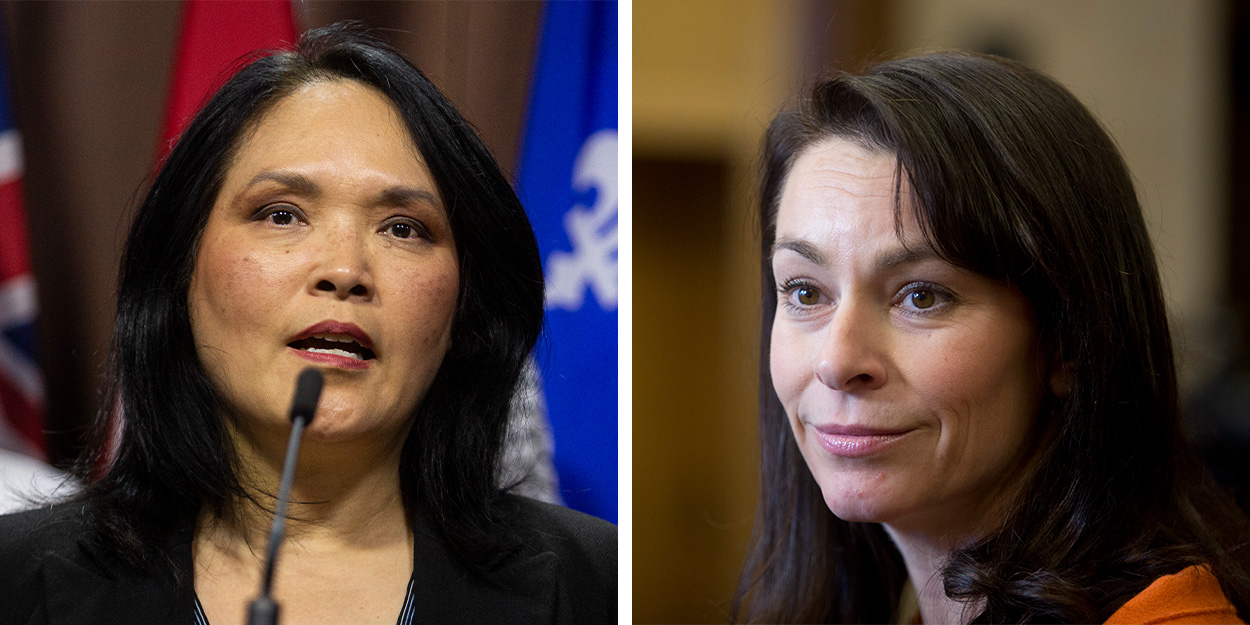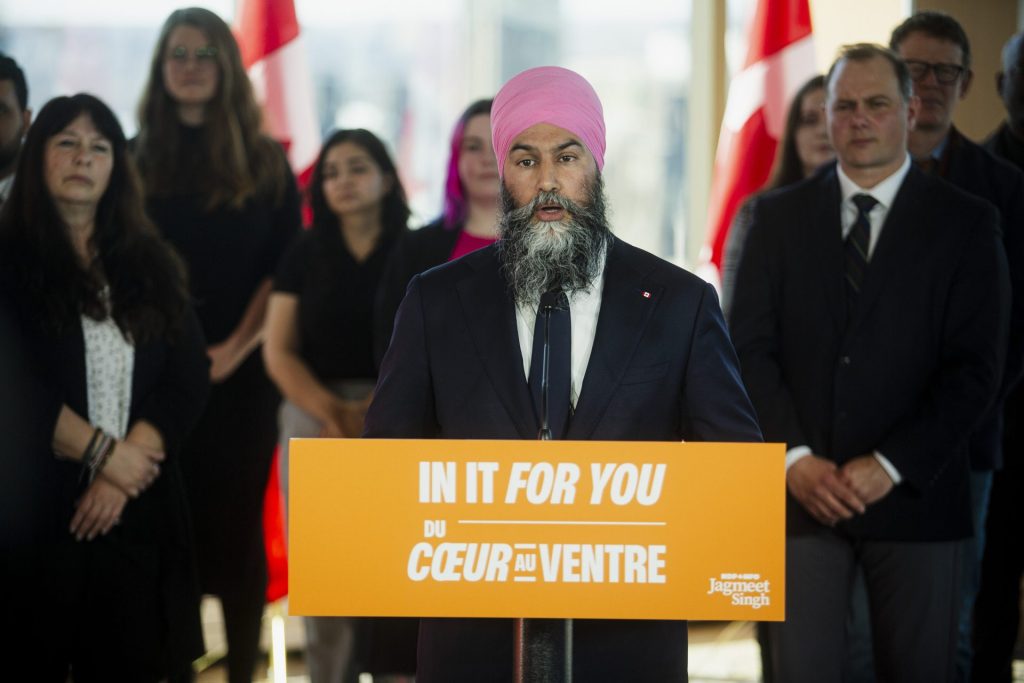‘Never say never’: NDP MPs Kwan and McPherson won’t rule out leadership bids, but say that’s not the focus right now

Returning NDP MPs Jenny Kwan and Heather McPherson say they are focused on rebuilding their party, but aren’t ruling out throwing their hats into the leadership ring after their party suffered the worst electoral losses since 1962 in last Monday’s federal election.
The New Democrats won only seven seats and 6.3 per cent of the vote nationally in the federal election on April 28. In the 2021 election, it won 25 seats and 17.8 per cent of the vote nationally. With only seven seats in the House now, it’s below the 12-seat threshold for official party status. The only other time the party’s seat count fell to single digits was in 1993 under Audrey McLaughlin’s leadership, when nine MPs were elected and the party won 6.9 per cent of the vote nationally.
“Of course, we’re disappointed,” said McPherson, who won Edmonton Strathcona, Alta., with a decisive 46.8 per cent of the vote. “I was really hopeful that we could elect more people in Alberta, but instead, we lost 18 excellent MPs, and that’s a loss for the NDP, but it’s a loss for Canada, as well.”
“We’ve had a small caucus before, and we will rebuild our caucus,” she said. “That’s going to be one of our goals, of course, but having a small caucus just means that we have to work harder, and New Democrats have always had to work harder.”
The highest-profile loss for the party was NDP Leader Jagmeet Singh, who finished third place in Burnaby Central, B.C., to Liberal Wade Chang. Singh won 18.2 per cent of the vote, Chang won 42.3 per cent, and the Conservative candidate won 38.6 per cent of the vote. In his concession speech on April 28, Singh announced he plans to step down as soon as an interim leader is selected.

Both Kwan (Vancouver East, B.C.) and McPherson were noncommittal when asked if leadership was part of their future plans.
Kwan said “in the life of politics, you never say never,” but stressed she hadn’t “thought about any of that,” because she is focused on “thinking about the work that needs to be done ahead.”
CBC News asked Kwan on April 30 if she’d cross the floor to the Liberals, who have 169 seats and need three more to form a majority. “Well, that’s a very interesting thought,” Kwan told CBC News. “As I say, I’m going to be focused on the issues itself. There may be moments where we can work collaboratively with the government to get things done, and that would be my primary goal, to get things done for Canadians.”
Kwan later clarified in an X post that she is open to “working collaboratively with other parties on public policy solutions but I am a New Democrat and will remain a New Democrat.”
McPherson also didn’t rule out running for the top job, saying simply: “I am not really there yet. I’m not having those conversations right now.” McPherson said the NDP caucus would be meeting on May 1, and that’s when the party will be “having conversations about what all of this looks like.”
A year ago, when the party was in the midst of its supply-and-confidence agreement with the government and the party had yet to tank in the polls, McPherson told The Hill Times she thought the next New Democrat federal leader should be a woman, and said “we’ll see” when asked about her future prospects.
Five other incumbent NDP MPs will be returning to the House of Commons: Leah Gazan (Winnipeg Centre, Man.), Gord Johns (Courtenay-Alberni, B.C.), Don Davies (Vancouver Kingsway, B.C.), Lori Idlout (Nunavut), and Alexandre Boulerice (Rosemont-La Petite Patrie, Que.).
Kwan said her immediate focus is holding the government to account, and representing the interests of her constituency, which sent her back to Ottawa for a fourth time with nearly 44 per cent of the vote, and more than 4,000 votes ahead of the Liberal second-place challenger.
Despite the election result, “the New Democrats’ voice will be heard in the House of Commons, and we will be loud,” said Kwan.
“We will be representing everyday people demanding actions from the government,” Kwan continued. “It’s not so much about ourselves as individuals, or even the party for that matter. What’s most important is about the people who we represent.”
Before becoming an MP, Kwan was an MLA in British Columbia—first in 1996, before she was re-elected in 2001 as one of only two NDP MLAs in a legislature where she “fought against” 77 Liberals. Kwan pointed to that experience as preparing her for the the future, saying she’s “been down this road before,” and is familiar with navigating Parliament as one of the few elected in her party.
“I have had experience faced with having lost party status, faced with the odds of being very lonesome voices—a lonesome voice—in that arena, and [I] fought hard to rebuild the party, fought hard to gain the trust of the electorate, and I will be doing that hard work here in House of Commons, as well with my other colleagues.”
How can the NDP rebuild after this loss?
Brad Lavigne, who served as the national director of the NDP from 2009 to 2011, said he’s “very optimistic” about what is next for New Democrats under new leadership.
Lavigne said he wants to see the party “re-embrace a culture of winning,” pointing to the party’s success under Jack Layton’s leadership in 2011 when the NDP formed official opposition. In that year’s federal election, the NDP won 103 seats and 30.6 per cent of the vote, and the win was dubbed “the orange wave.” At the time, Layton famously positioned his campaign as front-runner to be prime minister. Lavigne said that period “instilled a rigour, a rigid discipline of winning” in the party as the NDP “set out on a multi-year plan to win.”
During this federal election campaign, as the party’s polling plummeted, Singh pivoted from an early pitch insisting he was fighting to be Canada’s next prime minister to a more pragmatic approach. Once it became clear the NDP was significantly trailing in the polls—about halfway through the campaign—Singh shifted his message to urge voters to elect as many NDP MPs as possible so that they could hold the government accountable, and potentially push through some progressive policies.

McPherson expressed sadness at Singh’s resignation, saying Canadians will look back at his record “and recognize what an incredible leader he has been.” She pointed to NDP wins on health care, and Singh’s work in passing the Canadian Dental Care Plan, which is expected to provide public dental care coverage for up to nine million Canadians.
Still, she said a leadership race presents “an exciting opportunity” for the party. It should start conversations about a new direction for the party, noting that the Liberals are in their fourth term, which she called “not a position of strength,” presenting a potential opportunity for the NDP.
Matthew Dubé, a former Quebec NDP MP and vice president of Proof Strategies, said that while Singh accomplished much as the party’s leader, the party now needs to figure out “what it wants to be going forward,” whether that means aiming to form government or pitching the party as a means to hold governments accountable.
“For me, the party has always been what a political party should be … which is a vehicle for forming government,” he told The Hill Times. “But there are … others for whom it’s less of a priority, and just want to focus on the traditional view of the NDP as the conscience of Parliament.”
When asked about how her party could rebuild in light of the results, Kwan said the NDP needs to “start from the ground up,” put in “a lot of hard work,” and focus on “igniting the grassroots movement.”
The role of strategic voting
Kwan and McPherson pointed to the impact of strategic voting this election—both in their ridings and across the country. Kwan noted that, while canvasing, she spoke to many Canadians who were confused about how to vote strategically. One of the factors that contributed to her win, she said, was emphasizing to voters that the NDP could prevent a Conservative from being elected.
“I heard over and over again from people who wanted to stop the Conservatives, were worried about the Conservatives, and they were confused, actually, about what they should do,” she said.
McPherson said she heard the same from her constituents, as well—something she said points to the need for electoral reform. She said this campaign was “based on fear,” with voters casting their ballots informed by threats posed by U.S. President Donald Trump and a Conservative government.
“We need to make sure that Canadians can vote for the person they want,” and not who represents the “least bad” option.
NDP strategist Tom Parkin said the issue with strategic voting is that many people didn’t do it correctly, which resulted in a split progressive vote in some ridings. Of the 17 seats the NDP lost this election, 10 went Conservative—something Parkin said indicates that many voters thought voting strategically meant voting Liberal to keep out the Conservatives.
“It’s not a question about whether strategic thinking sunk the NDP. It’s more a question of people didn’t do it.”

This is something also highlighted by former NDP MP Charlie Angus, who opted not to run in the reconfigured riding of Kapuskasing-Timmins-Mushkegowuk, Ont.—which also fell to the Conservatives.
“Many thought this election would see a massive bleed-off of NDP voters to the centrist Liberals to stop [Conservative Leader Pierre] Poilievre and the Conservatives,” he wrote in an April 30 Substack post. “But that’s not how it played out. … In numerous races ‘strategic voting’ led to Conservative wins.”
Angus also pointed to the fact that this was not the case in all ridings where the NDP lost their seats. In some ridings, traditionally NDP voters—young people and working-class people—voted Conservative instead, a trend Angus called “troublesome.”
“The NDP and Democrats assumed that working-class and youth voters naturally belonged in our tent,” he wrote. “But if they no longer saw us as their voice, it was because we lost touch with our base.”
ewand@hilltimes.com
The Hill Times
Editor’s note: This story has been updated, including a correction on May 6 at 4:50 p.m. to report that 10 NDP-held ridings flipped to the Conservatives, not 13.






 LICENSING
LICENSING PODCAST
PODCAST ALERTS
ALERTS













